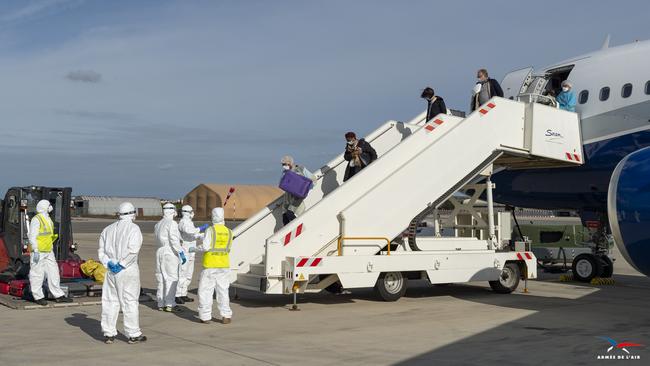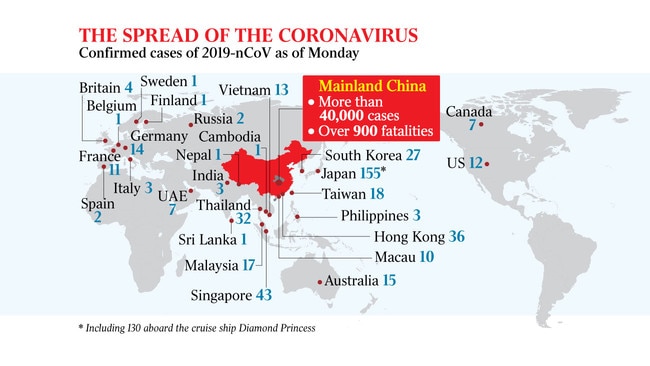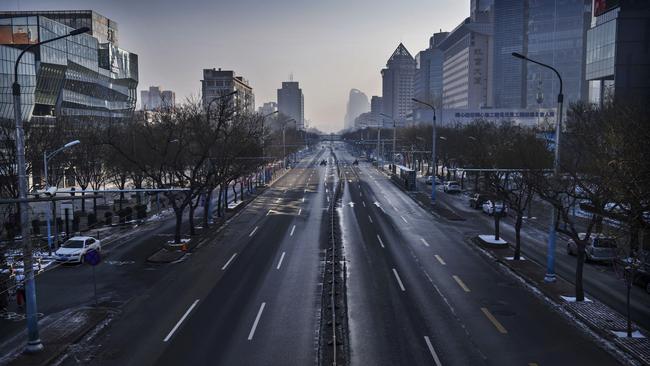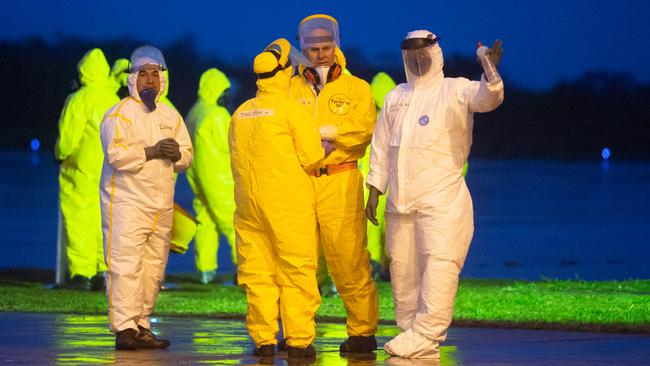Global fear a telling sign of how far China’s influence has spread
Remote areas such as Mauritius, Lapland and even Antarctica are gripped by coronavirus phobia thanks to China’s global reach.

The deadly coronavirus has spread from China to two dozen countries. So far, Iceland isn’t one of them.
That hasn’t stopped the country of 363,000 people from preparing a building called “Place X” to quarantine hundreds of people. Iceland has also established a co-ordination centre, where officials meet for daily briefings.
Officials in many remote corners — from Iceland to Antarctica — are rushing to prepare for the possible arrival of the virus, a reflection of China’s global reach and how quickly fear is spreading.
Since the coronavirus emerged in the Chinese city of Wuhan in late December, neighbouring nations including Thailand and Malaysia have reported several cases, as have large economic centres with established Chinese communities, including Paris and Sydney. The virus has also reached remote areas, such as northern Finland and the island of Tenerife, off the coast of West Africa.
Many places, no matter how distant from China, are not taking any chances. Even Antarctica is preparing. The Australian Antarctic Program says it has cancelled a flight set to bring 23 people to its research station on Macquarie Island and won’t let tourist ships visit the site.
About 18,000km from Wuhan, posters have been put up in the Falkland Islands, giving people advice on what they should do if they begin to feel ill. The information is also read to air and sea passengers when they arrive. The islands expect abut 60,000 tourists from cruise ships this summer.
The Falkland Islands’ only hospital has an isolation facility for patients with infectious diseases. Officials have plans to expand the area.
The preparations are in part a measure of how China’s growing economic heft has expanded its global reach and fuelled tourism worldwide. When severe acute respiratory syndrome, or SARS, fanned out from China in 2003, the country had the world’s sixth biggest economy. Now it is No 2 in GDP and No 1 in trade.

In 2002, about seven million Chinese people travelled beyond Hong Kong, according to Goldman Sachs. Now they take around 150 million international trips annually.
“In 2003, we hardly had any Chinese tourists. Last year, it was 100,000,” says Agust Gunnar Gylfason, project manager at Iceland’s Department of Civil Protection and Emergency Management.
The concern isn’t unfounded. The virus has spread to places such as Lapland, a region stretching into the Arctic Circle. In 2005, travellers from China spent a total of 5500 nights in Lapland, Visit Finland says. Last year, that went up to 108,000 nights.
A tourist from Wuhan tested positive after reporting being ill to health workers on January 29. Officials sent an epidemiologist and a Chinese-speaking researcher north from Helsinki who helped track down 21 people who had been in contact with the tourist, says Jussi Sane, who co-ordinated the response from the Department of Health Security. Many of the 21 possible contacts have also been placed in quarantine.

The East African island nation of Mauritius, which welcomes hundreds of thousands of Asian visitors every year, has opened overflow quarantine facilities, banned imports of live animals and stopped issuing work permits to Chinese workers.
Health Minister Kailesh Kumar Singh Jagutpal said last week all travellers from China, regardless of nationality, would be placed in quarantine.
The Caribbean island of Jamaica hasn’t confirmed any cases. Nonetheless, the country says it has prepared quarantine centres and increased medicine stocks
Greenland, the world’s largest island — but with a population of just 56,000 — is also making preparations. Increasing numbers of Chinese people visit the country as tourists, or because of their involvement in the local fishing and mineral-prospecting industries.

“This is a very big country and we don’t know where the first case may turn up,” says Henrik Hansen, the country’s chief medical officer.
Greenland would have the added headache of testing for coronavirus by sending samples to Denmark, of which it is an autonomous province. Hansen hopes to get such laboratory capabilities set up on Greenland soon.
In some places, fear is spreading faster than the virus. Last week, police in the remote Canadian town of Kenora evacuated the post office after two employees complained of being ill after a package arrived from Wuhan.
Health authorities would later assure people the virus couldn’t be spread through inanimate objects.
However, in Chile, a health official asked people to handle packages from China with gloves.
The Wall Street Journal



To join the conversation, please log in. Don't have an account? Register
Join the conversation, you are commenting as Logout